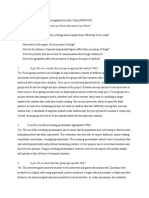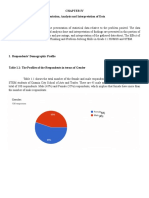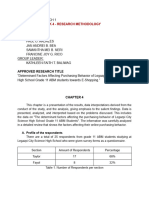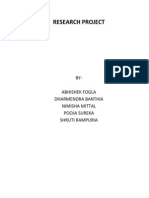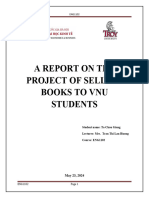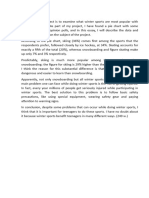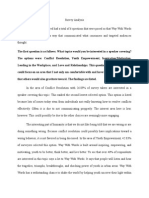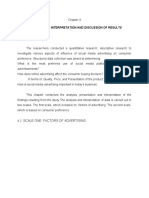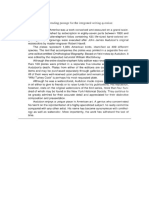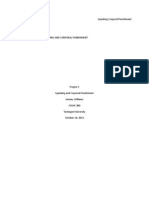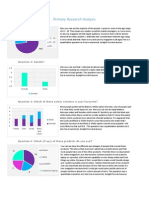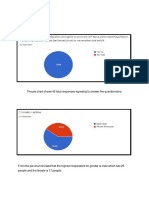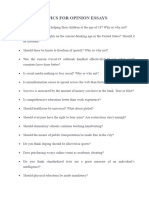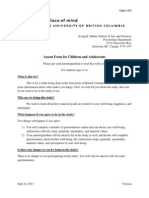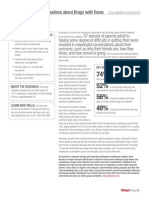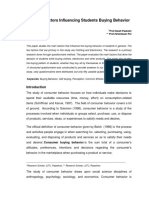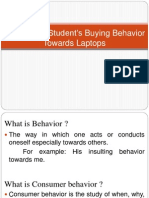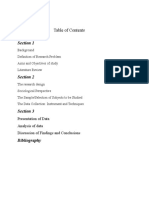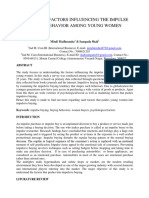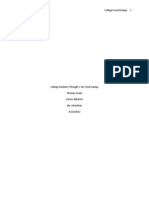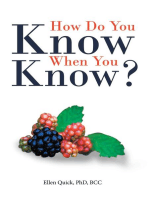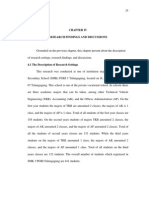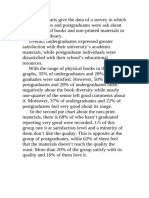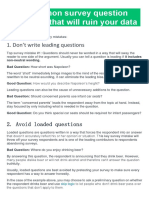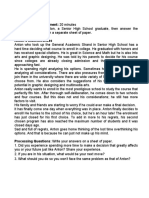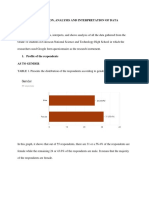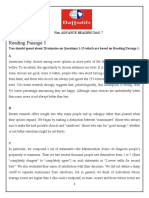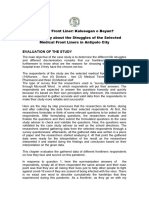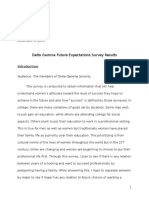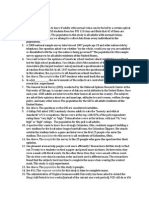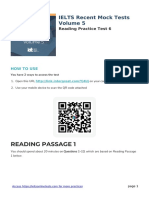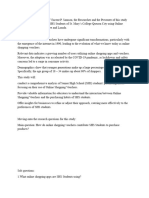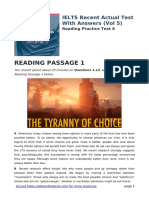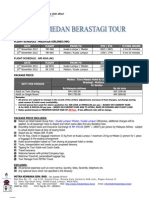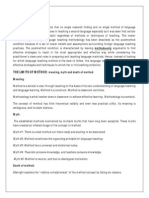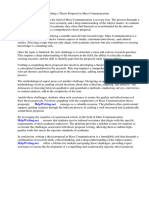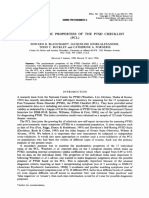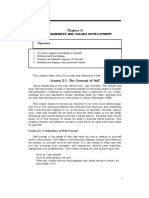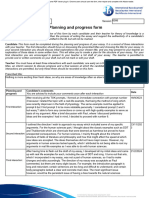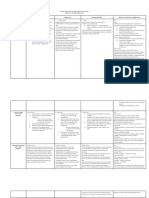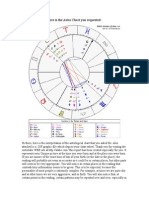Does RM250 Would Be Sufficient For You: Chapter 3: Findings and Discussion
Does RM250 Would Be Sufficient For You: Chapter 3: Findings and Discussion
Uploaded by
WanM.SyamimCopyright:
Available Formats
Does RM250 Would Be Sufficient For You: Chapter 3: Findings and Discussion
Does RM250 Would Be Sufficient For You: Chapter 3: Findings and Discussion
Uploaded by
WanM.SyamimOriginal Description:
Original Title
Copyright
Available Formats
Share this document
Did you find this document useful?
Is this content inappropriate?
Copyright:
Available Formats
Does RM250 Would Be Sufficient For You: Chapter 3: Findings and Discussion
Does RM250 Would Be Sufficient For You: Chapter 3: Findings and Discussion
Uploaded by
WanM.SyamimCopyright:
Available Formats
CHAPTER 3: FINDINGS AND DISCUSSION 3.
1 Introduction This chapter constitutes the discussion of the results from the data gathered. The findings presented here were based on the instrument used; the questionnaires. This chapter will explain about the analysis of the results of the questions as well as the discussion. Section A Yes and No Questions 1 . Does RM250 would be sufficient for you?
Does RM250 would be sufficient for you
25
25
Yes No
50% of respondents which are 25 students agreed that RM250 is sufficient for them to receive as the amount of the book vouchers, while the other 50% of respondents disagreed with the amount. In conclusion, numbers of respondents chooses yes and no are both equal.
2. The voucher can only be used only once in your life as a student. Is it good for you?
Is it good that the voucher can only be used once in life?
25
25
Yes No
50% of respondent which are 25 students agreed that using the voucher once in a life time is good for them. On the other hand, 50% of respondent thought otherwise. In conclusion, equal number of respondent thought that it is good that the voucher can only be used only once.
3. Should the government expand the use of the book voucher to every store available nationwide?
Preference on expansion of the book voucher to every book store nationwide
1
Yes No
49
98% of respondents agreed that the government should expand the use of the book voucher to every store available nationwide. On the other hand, only 2% thought otherwise. This is probably because it will be easier for them to buy books at the bookstore which available at their place. Based on the pie chart, we can see that 49 of the respondents chose Yes as their answer for question 3 and only one of the respondent chose No as their answer. In conclusion, most of the respondents agreed that government should expand the use of book voucher to every store available nationwide.
4. Is it worth the effort that the government provide the voucher to students?
Is it worth the effort that the government provide the voucher to students?
6
Yes No
44
88% of respondent agreed that book voucher is one of the best effort by the government. This is probably because with the book voucher, respondent can reduce their own money usage. In other hand, there is only 12% of respondent thought otherwise. Based on the pie chart, we can see that 44 of the respondent choose yes as their answer and only 12 of the respondent choose no as their answer. In conclusion, most of the respondent agreed that book voucher is one of the best efforts that government provided for students.
5. Is the book voucher better than having a kad siswa or a food voucher?
Is the book voucher better than having a kad siswa or a food voucher?
17
Yes No 33
Based on the pie chart, 66% of the respondent agreed that book voucher is better than having a book voucher or food voucher. This is probably because book voucher is the most important thing for them to buy books for their study. In other hand, there is 34% of respondent thought otherwise. As we can see, there is 33 of respondent choose yes as their answer for this question and 17 of respondent choose no as their answer. In conclusion, most of the respondent agreed that having a book voucher is better than having a kad siswa or a food voucher.
Section B Multiple Choice Questions 6. If RM250 is not sufficient, what value would you prefer for a book voucher?
The value that the students prefer for the book voucher
12 21 RM300 - RM400 RM400 - RM500 RM500 - RM600
17
42% which is the majority of respondents prefer RM500-RM600 as the amount for the book voucher. This is probably because nowadays, the price of books is getting more expensive. 24% of the respondents which shows the least percent of respondents prefer RM300-RM400. For RM400-RM500, 34% of respondents prefer it as the value for the book voucher. Based on the pie chart, 21 of respondents prefer RM500-RM600, 17 of respondents prefer RM400-RM500 and 12 out of 50 respondents prefer RM300-RM400. In conclusion, RM500-RM600 has been agreed the most by the respondents as the value for book voucher.
7. What period of time would you prefer for the validity of the voucher?
Preference for period of validity of the voucher
0 7
6 months 1 year 2 years No validity/Unlimited validity
36
Based on our research, the pie chart shows that 72% (35 respondents) out of 50 respondents preferred for no validity or unlimited validity for the voucher. This is probably that most of the respondents think that it is easier to have no validity for the voucher in case for future book fair event. It can be seen that 14% (7 respondents) choose each option that is 1 year and 2 years respectively. None of the respondents preferred on the option 6 months for the period of validity. In conclusion, most of the respondents preferred to have no validity for the voucher.
8. What would you do with the book voucher?
Things to do with the voucher
4
16 Buy my favourite novels, magazines and comics Buy reference books for my studies Sell the boook voucher to people who need it
30
Based on the pie chart, 60% (30 respondents) out of 50 respondents wanted to buy reference books rather than the other choices. This is most likely because the respondents are keen to get better results in upcoming examinations. On the other hand, it can be seen that 8% (4 respondents) wanted to sell the voucher instead. In addition, the graph shows about 32% (16 respondents) wanted to buy novels, magazines and comics with the book voucher. As a conclusion, most of the respondents would prefer buying reference books rather than buying novels, magazines, comics or even sell the voucher.
9. If you are given the freedom in buying anything rather than books, what would you buy?
Things that respondents would buy if they are given freedom to buy anything
3
17 Gadgets Personal items Foods I would still buy books
21
Based on the pie chart, 42% (21 respondents) prefer to buy personal items instead of gadgets, foods and books. This is probably that personal items are more important than the other choices to live for. Moreover, 34% (17 respondents) preferred to buy gadgets while 18% (9 respondents) would rather buy food than gadgets. Furthermore, the graph shows that 6% (3 respondents) thinks that if they are given such freedom with the voucher, they will still buy books. As a conclusion, most of the respondents thinks that if they are given the freedom to buy anything with the voucher, they wanted to buy personal items rather than gadgets, foods and books.
10. In your opinion, why are students are willing to sell off their book voucher for quick money?
The factors student willing to sell of their book voucher for quick money
14 21
Short period of validity Other students didn't get the voucher as early as themselves Books are not important rather than other things 5 Shortage on money
10
Based on the research we have done, the pie chart depict that 42% (21 respondents) out of 50 respondents has chosen the factor that student are willing to sell off their book voucher is shortage on money. This is probably because by selling their book voucher, respondents can greatly reduce their own money usage. On the other hand, there is 28% (14 respondents) has chosen short period of validity for their answer while 20% (10 respondents) answered books are not important rather than other things for their choices. In addition, the other 10% (5 respondents) thinks that the factor that students are willing to sell off their book voucher is other students did not get the voucher as early as themselves. In conclusion, most of the respondents agreed that shortage on money is the most convincing factor that students are willing to sell off their voucher.
Section C Likert Scale Questions 11. The book voucher helps to improve the students result
The book voucher helps to improve the students' result
1 11 11
Strongly agree Agree Disagree Strongly disagree
27
Based on our research, the pie chart shows that the most of the respondent which covers about 54% (27 respondents) of the pie chart agreed on the statement. This is most likely because the respondents agree on the statement up to a certain extend but doesnt really sure how it improves someones result just by a help of a voucher. Furthermore, there is a split of 44% of the respondents which is 11 respondents respectively thinks that they are strongly agree and disagree on the statement. Meanwhile, the other 2% (1 respondent) shows that he/she is strongly disagree that the book voucher helps to improve the students results. In a nutshell, most of the respondents agree that the book voucher helps to improve the students results.
12. The book voucher helps to reduce my own money usage.
The book voucher helps to reduce my own money usage
0
17 Strongly agree Agree Disagree 33 0 Strongly disagree
Based on the pie chart, 66% of the respondents strongly agree that the book voucher helps to reduce their own money usage. This is probably because nowadays the price of books is getting more expensive. However, 34% agreed with the statement. There is no respondent who disagree and strongly disagree. As we can see, 33 of the respondents prefer strongly agree, 17 of the respondents prefer agree and there are no respondents disagree and strongly disagree respectively. In conclusion, majority of the respondents strongly agree that book voucher helps to reduce their own money usage.
13. I felt guilty for spending the voucher in a wrong way
I felt guilty for spending the voucher in a wrong way
11 18 Strongly agree Agree 6 Disagree Strongly disagree
15
Based on the pie chart, 36% (18 respondents) strongly agree that they feel guilty for spending the voucher in a wrong way while 12% (6 respondents) disagree that they feel guilty for spending the voucher in a wrong way. Probably students strongly agree because they have higher integrity level in themselves that makes them not using the voucher in a wrong way. On the other hand, 15 respondents agree and 11 respondents disagree that they feel guilty for spending the voucher in a wrong way. In a conclusion, probably students strongly agree because they have higher integrity level in themselves.
14. The validity period is too short
The validity period is too short
0 3
14 Strongly agree Agree Disagree Strongly disagree 33
Based on the pie chart, 66% of the respondents strongly agree that the validity period of the book voucher is too short. This is probably because they need to think what type of book they want to buy. In the other hand, there is 28% agreed with the statement while only 6% disagreed. There is no respondents choose for strongly agree. 14 of the respondents prefer agree, 3 of the respondents prefer disagree and no respondents prefer strongly disagree respectively. In conclusion, majority of the respondents strongly agree that validity period of book voucher is too short.
15. Books are not the most demanding things for me to acquire
Books are not the most demanding things for me to acquire
11 12
Strongly agree Agree 4 Disagree Strongly disagree
23
Based on the pie chart, 46% (23 respondents) agree that books are not the most demanding things to acquire while 8% (4 respondents) strongly disagree that books are not the most demanding things to acquire. Probably students can download the notes and exercise from the internet or they can get guidance from the lecturers. On the other hand, 12 respondents strongly agree, 11 respondents disagree and 4 respondents strongly disagree that books are not the most demanding things to acquire. In a conclusion, probably the students agree that books are not the most demanding things to acquire because they can download the notes and exercises from the internet or they can get guidance from the lecturers.
You might also like
- The Five Life Decisions: How Economic Principles and 18 Million Millennials Can Guide Your ThinkingFrom EverandThe Five Life Decisions: How Economic Principles and 18 Million Millennials Can Guide Your ThinkingRating: 3 out of 5 stars3/5 (1)
- Educational Beliefs and PracticesDocument3 pagesEducational Beliefs and Practicesapi-357528761No ratings yet
- Learning Intentions Success Criteria PP 1Document24 pagesLearning Intentions Success Criteria PP 1Waseem ParkarNo ratings yet
- Drama Lesson PlanDocument6 pagesDrama Lesson Planapi-252669170No ratings yet
- Intro To BioSocial MedicineDocument213 pagesIntro To BioSocial MedicineHessaNo ratings yet
- Boston Fight Drugs (A) : 1. (5 PTS) What Are Decision Problems and Research Problems?Document3 pagesBoston Fight Drugs (A) : 1. (5 PTS) What Are Decision Problems and Research Problems?Grace Chan100% (1)
- Lu Jong Tibetan Healing YogaDocument2 pagesLu Jong Tibetan Healing YogaSonidos Rayos Luces0% (1)
- The Lost Art of ListeningDocument30 pagesThe Lost Art of ListeningCri Ce LaNo ratings yet
- Chapter 4Document11 pagesChapter 4Dara SolonNo ratings yet
- Performance Task 5 - Research Chapter IV - Group 4 ABM TaylorDocument8 pagesPerformance Task 5 - Research Chapter IV - Group 4 ABM TaylorKathleen Faith Tercero BaliwagNo ratings yet
- Research Project: BY-Abhishek Fogla Dharmendra Banthia Nimisha Mittal Pooja Sureka Shruti RampuriaDocument24 pagesResearch Project: BY-Abhishek Fogla Dharmendra Banthia Nimisha Mittal Pooja Sureka Shruti RampuriafoglaabhishekNo ratings yet
- ENG1102 Final ReportDocument26 pagesENG1102 Final ReportTạ Châu GiangNo ratings yet
- Rabochaya Tetrad Part 1Document6 pagesRabochaya Tetrad Part 1Nina ComiNo ratings yet
- RRDocument11 pagesRRBảo BảoNo ratings yet
- Survey AnalysisDocument4 pagesSurvey Analysisapi-298847938No ratings yet
- Chapter 4Document20 pagesChapter 4Chrisdel Ann CosteloNo ratings yet
- Part 1: Please Read The Directions Below, Then Answer The Questions by Checking "Yes" or "No."Document3 pagesPart 1: Please Read The Directions Below, Then Answer The Questions by Checking "Yes" or "No."prichmond62No ratings yet
- Science Fair Project.Document11 pagesScience Fair Project.Cool Blue TunesNo ratings yet
- All Speaking and Writing TopicsDocument12 pagesAll Speaking and Writing Topicsdeeerla azertNo ratings yet
- Mdm4u 3Document2 pagesMdm4u 3punita0369No ratings yet
- Attitudes of Young Adults Towards MarriageDocument12 pagesAttitudes of Young Adults Towards MarriageMehzabin DishaNo ratings yet
- Conf Bias Minor ProjectDocument2 pagesConf Bias Minor Project20UECA076 20UECA076No ratings yet
- WritingDocument8 pagesWritingTấn PhátNo ratings yet
- Spanking Corporal PunishmentDocument34 pagesSpanking Corporal PunishmentJ-Money WilliamsNo ratings yet
- Primary Research Analysis: Question 1: Age Group?Document2 pagesPrimary Research Analysis: Question 1: Age Group?TheasdfkidNo ratings yet
- Test 5Document3 pagesTest 5Diệu NgọcNo ratings yet
- Data Analysis: The Pie Chart Shows 42 Total Responses Agreeing To Answer The QuestionnaireDocument13 pagesData Analysis: The Pie Chart Shows 42 Total Responses Agreeing To Answer The QuestionnaireafiyqNo ratings yet
- Writing Task 1 OfficialDocument4 pagesWriting Task 1 OfficialHuong DuongNo ratings yet
- Is Happiness Relative?: This Demonstration Provides A Good Accompaniment ToDocument4 pagesIs Happiness Relative?: This Demonstration Provides A Good Accompaniment TobilabilaNo ratings yet
- Mba404 T2 2023Document8 pagesMba404 T2 2023awasthisailesNo ratings yet
- Opinion EssaysDocument4 pagesOpinion Essaysmynameishere13579113No ratings yet
- Informed Assent Form For ChildrenDocument2 pagesInformed Assent Form For ChildrenRenaissanceTeamNo ratings yet
- Crucial Conversations About Drugs With Teens SummaryDocument1 pageCrucial Conversations About Drugs With Teens SummaryvinodksahuNo ratings yet
- The 20th Century through Children's Eyes | Children's Modern HistoryFrom EverandThe 20th Century through Children's Eyes | Children's Modern HistoryNo ratings yet
- Study of Factors Influencing Students Buying Behavior: Keywords: Buying Behavior, Self Buying, Perception, Common EffectsDocument10 pagesStudy of Factors Influencing Students Buying Behavior: Keywords: Buying Behavior, Self Buying, Perception, Common EffectsFemyNo ratings yet
- A Study On Students Buying Behavior Towards LaptopsDocument43 pagesA Study On Students Buying Behavior Towards LaptopsShashank Tripathi100% (3)
- Untitled DocumentDocument5 pagesUntitled Documentsiti putri nur kumalasariNo ratings yet
- G321 Foundation Portfolio: Kieran GouldingDocument13 pagesG321 Foundation Portfolio: Kieran GouldingKieranMediaNo ratings yet
- Sociology IA 2016Document19 pagesSociology IA 2016TichelleNo ratings yet
- Test 8Document9 pagesTest 8Papia SultanaNo ratings yet
- Questionnaires: Asking QuestionsDocument21 pagesQuestionnaires: Asking QuestionsMr DamphaNo ratings yet
- 050 Mithali & Sampada ShahDocument11 pages050 Mithali & Sampada ShahteamybymeNo ratings yet
- Research Report Final DraftDocument46 pagesResearch Report Final DraftThomas Colossus GrantNo ratings yet
- Research Findings and DiscussionsDocument8 pagesResearch Findings and DiscussionsAnonymous oZ16O3OoQNo ratings yet
- Survey DiagramDocument1 pageSurvey Diagramngtu2k3No ratings yet
- 5 Common Survey Question MistakesDocument3 pages5 Common Survey Question MistakesEmerica LlanesNo ratings yet
- Amiel, Henri FredericDocument15 pagesAmiel, Henri FredericMrinmoyee ShosheeNo ratings yet
- Understanding Kids - A Marketing Research PerspectiveDocument3 pagesUnderstanding Kids - A Marketing Research PerspectiveLovleen WaliaNo ratings yet
- Quarter 1. Module 3 HomeroomDocument5 pagesQuarter 1. Module 3 HomeroomJaylord Bancud CamayangNo ratings yet
- Presentation, Analysis and Interpretation of DataDocument5 pagesPresentation, Analysis and Interpretation of DataMichaelson CarabotNo ratings yet
- Reading Passage 1: You Should Spend About 20 Minutes On Questions 1-13 Which Are Based On Reading Passage 1. ADocument14 pagesReading Passage 1: You Should Spend About 20 Minutes On Questions 1-13 Which Are Based On Reading Passage 1. AminakshiminsNo ratings yet
- EvaluationDocument3 pagesEvaluationabegailsudayon.sjwmsaNo ratings yet
- Murray SurveyDocument14 pagesMurray Surveyapi-313798961No ratings yet
- Statistics HMWKDocument12 pagesStatistics HMWKAnterika Williams100% (1)
- 如易雅思4月13日小作文小范围预测Document14 pages如易雅思4月13日小作文小范围预测duanwenxuan666No ratings yet
- 2020 Shopper Insights Report: 213 Court ST, Middletown, CT 06457 860-346-2700Document13 pages2020 Shopper Insights Report: 213 Court ST, Middletown, CT 06457 860-346-2700ameliaNo ratings yet
- Study On Purchasing Behaviour of Males & FemalesDocument8 pagesStudy On Purchasing Behaviour of Males & FemalesPrince Chaudhry50% (2)
- AngelDocument9 pagesAngelapi-459344096No ratings yet
- Reading Passage 1: IELTS Recent Mock TestsDocument18 pagesReading Passage 1: IELTS Recent Mock TestsMinh Nhat ThanNo ratings yet
- DocumentDocument5 pagesDocumentjohnsamsonassetsnbanksNo ratings yet
- Reading Passage 1: IELTS Recent Actual Test With Answers (Vol 5)Document17 pagesReading Passage 1: IELTS Recent Actual Test With Answers (Vol 5)Mai Quỳnh AnhNo ratings yet
- Interest & PersonalityDocument5 pagesInterest & PersonalityWanM.SyamimNo ratings yet
- Bee4333 Intelligent Control: Artificial Neural Network (ANN)Document76 pagesBee4333 Intelligent Control: Artificial Neural Network (ANN)WanM.SyamimNo ratings yet
- Physical Properties of Alkanes & Cycloalkanes: Boiling PointDocument15 pagesPhysical Properties of Alkanes & Cycloalkanes: Boiling PointWanM.SyamimNo ratings yet
- Tutorial#1Document4 pagesTutorial#1WanM.Syamim50% (2)
- 5D4N Medan Berastagi TourDocument5 pages5D4N Medan Berastagi TourWanM.SyamimNo ratings yet
- Scheme of Work BIOLOGY FORM 4, 2010Document28 pagesScheme of Work BIOLOGY FORM 4, 2010WanM.Syamim0% (1)
- Makalah Inggis Chapter 1Document18 pagesMakalah Inggis Chapter 1smpnegeri1jatiluhurNo ratings yet
- Participant PDocument17 pagesParticipant PSarah Queen Ardelyn EnciaNo ratings yet
- Displacement, Hybridity & Identity Crisis:a Post Colonial Analysis of Bhutto's Novel The RunawaysDocument12 pagesDisplacement, Hybridity & Identity Crisis:a Post Colonial Analysis of Bhutto's Novel The RunawaysAdil ShanNo ratings yet
- 1st Prelim EAPPDocument2 pages1st Prelim EAPPJames Alexander DezaNo ratings yet
- The Customer Is Not Always RightDocument11 pagesThe Customer Is Not Always RightyaminshaikhNo ratings yet
- Barricade Hostage Case Studies PDFDocument24 pagesBarricade Hostage Case Studies PDFCharles Michael Gastilo SalasNo ratings yet
- Postmethod Condition and PedagogyDocument4 pagesPostmethod Condition and PedagogyEmad JamshidiNo ratings yet
- Thesis Proposal Sample For Mass CommunicationDocument4 pagesThesis Proposal Sample For Mass Communicationfjgtq12d100% (2)
- History of Petroleum Geology Committee: About AAPGDocument2 pagesHistory of Petroleum Geology Committee: About AAPGBambang RifqiNo ratings yet
- Learning Activities Workbook 1Document8 pagesLearning Activities Workbook 1NyraStardollNo ratings yet
- Q2 W1 Per - Dev.Document16 pagesQ2 W1 Per - Dev.jeysel calumbaNo ratings yet
- NFDN 2005 Report On Progress of Professional PortfolioDocument2 pagesNFDN 2005 Report On Progress of Professional Portfoliosantababy100% (1)
- 1996 Blanchard Jones-Alexander Buckley Forneris Psychometric Properties of The PTSD Checklist (PCL) PDFDocument5 pages1996 Blanchard Jones-Alexander Buckley Forneris Psychometric Properties of The PTSD Checklist (PCL) PDFvkyandiNo ratings yet
- Self Awareness and Values Development: ObjectivesDocument14 pagesSelf Awareness and Values Development: Objectives2D JOVE, Jan Roey, BongatNo ratings yet
- TOK Essay Interaction FormDocument2 pagesTOK Essay Interaction FormbillssrNo ratings yet
- Post Test IndusPsych With KeyDocument12 pagesPost Test IndusPsych With KeyKemNo ratings yet
- HistoryofreadingDocument10 pagesHistoryofreadingapi-305248498No ratings yet
- DE AUSTRIA, Via Samantha BDocument3 pagesDE AUSTRIA, Via Samantha BVia Samantha de AustriaNo ratings yet
- Here Is The Astro Chart You RequestedDocument4 pagesHere Is The Astro Chart You RequestedMari FereNo ratings yet
- Virtual CommunityDocument8 pagesVirtual CommunityRamin HamzaNo ratings yet
- Rosanna Tan Andal vs. AndalDocument7 pagesRosanna Tan Andal vs. AndalIrin200No ratings yet
- Natalia Vanni: EducationDocument1 pageNatalia Vanni: Educationapi-285024378No ratings yet
- A Semi-Detailed Lesson PlanDocument3 pagesA Semi-Detailed Lesson PlanDARWIN GUNDALENo ratings yet





